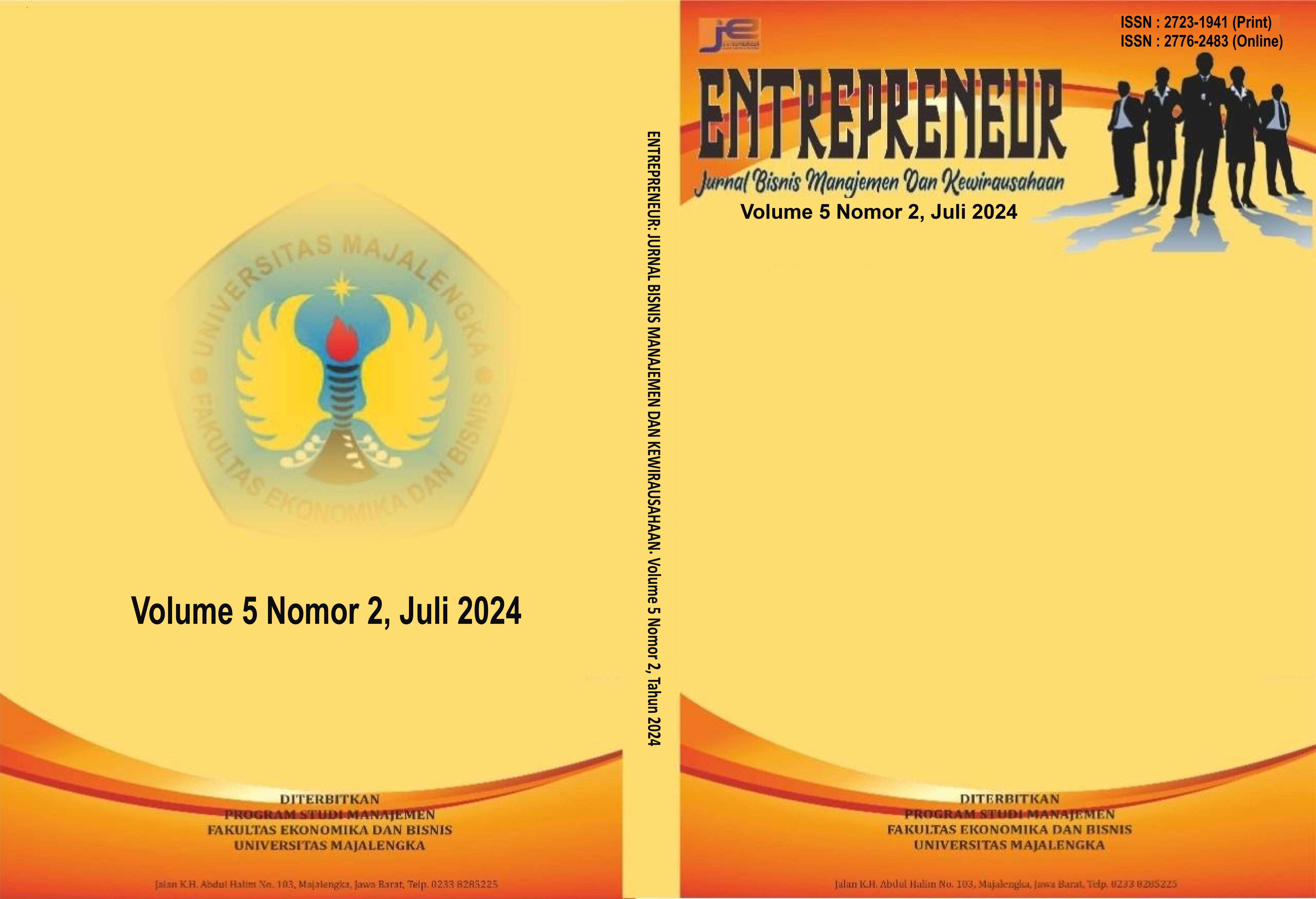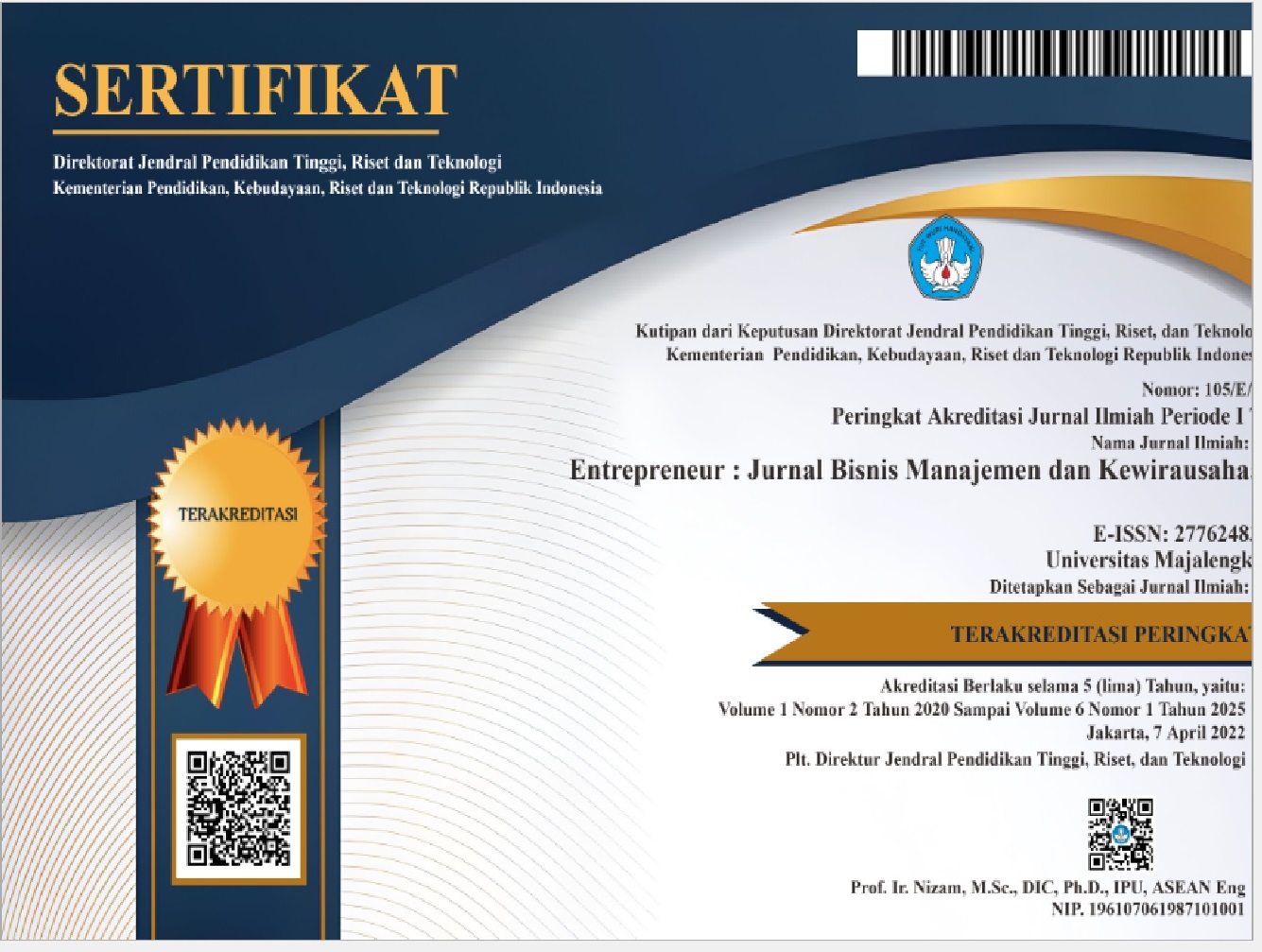Pengaruh Jumlah Uang Beredar, Suku Bunga Dan Nilai Tukar Terhadap Inflasi Di Indonesia Pada Tahun 2014-2023
DOI:
https://doi.org/10.31949/entrepreneur.v5i2.9104Abstract
The purpose of this study was to determine the effect of money supply, interest rates, and exchange rates on inflation in Indonesia for the period 2014-2023. The type of data in this study uses quantitative data and the data source used is secondary data during the period 2014-2023. Data analysis using multiple linear regression analysis methods. The result that the variable money supply has a positive and significant effect on inflation. The interest rate variable has a positive and insignificant effect on inflation. The exchange rate variable has a negative and significant effect on inflation. For the government to prepare steps in implementing monetary policy related to the problem of money supply, interest rates and exchange rates that can affect inflation.
Keywords:
Exchange Rates, Inflation, Interest Rates, Money SupplyDownloads
References
A. Mahendra. (2016). Analisis Pengaruh Jumlah Uang Beredar. Jrak, 2(1), 1–12.
Adrian Sutawijaya. (2012). Inflasi Di Indonesia : 1(1), 54–67.
Amaliyah, F., & Aryanto, A. (2022). Pengaruh Jumlah Uang Beredar Dan Suku Bunga Terhadap Inflasi Di Indonesia. Owner, 6(2), 1342–1349. Https://Doi.Org/10.33395/Owner.V6i2.737
Anggraeni, D. S. N. (2022). Analysis Of Factors Affecting Inflation In Indonesia During The Covid-19 Pandemic. Jurnal Forum Analisis Statistik (Formasi), 1(2), 109–122. Https://Doi.Org/10.57059/Formasi.V1i2.23
Anggun Sriwahyuni, Pinondang Nainggolan, & Anggiat Sinurat. (2020). Pengaruh Jumlah Uang Beredar, Suku Bunga Dan Nilai Tukar Terhadap Inflasi Di Sumatera Utara. Jurnal Ekuilnomi, 2(2), 60–72. Https://Doi.Org/10.36985/Ekuilnomi.V2i2.107
Budhi, P. T. E. &, & Sri, S. M. K. (2012). Pengaruh Pdb, Nilai Tukar Dan Jumlah Uang Beredar Terhadap Inflasi Di Indonesia Periode 1993-2012. E-Jurnal Ep Unud, 334–343.
Dian Mira Larasati, A. A. (2017). Pengaruh Tingkat Suku Bunga Sertifikat Bank Indonesia Dan Nilai Tukar Terhadap Inflasi Indonesia. Ilmiah Mahasiswa (Jim), 2(1), 535–534.
Fauziyah, W. E. N. ;, & Cahyono, H. ( F. E. ;Universitas N. S. (2014). Pengaruh Bi Rate Dan Jumlah Uang Yang Beredar Terhadap Tingkat Inflasi Di Indonesia Wenny Elies Nur Fauziyah Hendry Cahyono Abstrak. 1–9.
Ghozali, I. (2011). Ghozali_Imam_2011_Aplikasi_Analisis_Mult.Pdf (P. 129).
Herawati, M. (2021). Analisis Perubahan Nilai Tukar Rupiah Akibat Peningkatan Inflasi, Tingkat Suku Bunga Sbi Dan Pertumbuhan Ekonomi (Studi Pada Bank Indonesia Periode 2008 – 2017). Jurnal Ekonomi, 23(1), 20. Https://Doi.Org/10.37721/Je.V23i1.759
Lieb, L., & Schuffels, J. (2022). Inflation Expectations And Consumer Spending: The Role Of Household Balance Sheets. In Empirical Economics (Vol. 63, Issue 5). Springer Berlin Heidelberg. Https://Doi.Org/10.1007/S00181-022-02222-8
Mahendra, A. (2016). Analisis Pengaruh Jumlah Uang Beredar, Suku Bunga Sbi Dan Nilai Tukar Terhadap Inflasi Di Indonesia. Jurnal Riset Akuntansi & Keuangan, 1–12. Https://Doi.Org/10.54367/Jrak.V2i1.170
Manuela Langi Theodores ,Masinambow Vecky, S. H. (2014). Analisis Pengaruh Suku Bunga Jml Uang Beredar Kurs Thdp Inflasi Indonesia. 14(2).
Maulana, R. A., Sarfiah, S. N., & Prasetyanto, P. K. (2020). Pengaruh Ekspor, Suku Bunga Dan Nilai Tukar Terhadap Inflasi Di Indonesia. Dinamic: Directory Journal Of Economic , 2(3), 675–684.
Meliza. (2023). Pengaruh Dana Pihak Ketiga Terhadap Profitabilitas Bank Perkreditan Rakyat Dengan Suku Bunga Sebagai Variabel Moderasi. 4, 33–41.
Purnomo, T. H. (2013). Pengaruh Nilai Tukar, Suku Bunga, Dan Inflasi Terhadap Return Saham Pada Perusahaan Properti. 2(10), 2005–2010.
Putri, V. K. (2017). Analisis Pengaruh Jumlah Uang Beredar, Suku Bunga Sertifikat Bank Indonesia, Dan Suku Bunga Kredit Investasi Terhadap Inflasi Di Indonesia. Jom Fekon, 4(1), 26–39.
Rahardjo, K. A. (2024). Economics And Digital Business Review Pengaruh Suku Bunga , Jumlah Uang Beredar Dan Nilai Tukar Rupiah Terhadap Tingkat Inflasi Tahun 2018-2022. 5(1), 345–354.
Silaban, S., Aadilah, H., & Matondang, K. (2023). Influence Of Rupiah Exchange Rate On Indonesia’s Economic Growth: Literature Study. Journal Of Business Management And Economic Development, 1(02), 123–131. Https://Doi.Org/10.59653/Jbmed.V1i02.48
Xu, W., Wang, K., & Anandarajan, A. (2012). Quality Of Reported Earnings By Chinese Firms: The Influence Of Ownership Structure. Advances In Accounting, 28(1), 193–199. Https://Doi.Org/10.1016/J.Adiac.2012.03.005

Published
How to Cite
Issue
Section
License
Copyright (c) 2024 Mei Nia Widyaningrum, Meliza

This work is licensed under a Creative Commons Attribution-ShareAlike 4.0 International License.
COPYRIGHT NOTICE
An author who publishes in the Entrepreneur: Jurnal Bisnis Manajemen dan Kewirausahaan agrees to the following terms:
1. Author retains the copyright and grants the journal the right of first publication of the work simultaneously licensed under the Creative Commons Attribution-ShareAlike 4.0 License that allows others to share the work with an acknowledgment of the work's authorship and initial publication in this journal
2. The author is able to enter into separate, additional contractual arrangements for the non-exclusive distribution of the journal's published version of the work (e.g., post it to an institutional repository or publish it in a book) with the acknowledgment of its initial publication in this journal.
3. The author is permitted and encouraged to post his/her work online (e.g., in institutional repositories or on their website) prior to and during the submission process, as it can lead to productive exchanges, as well as earlier and greater citation of the published work







